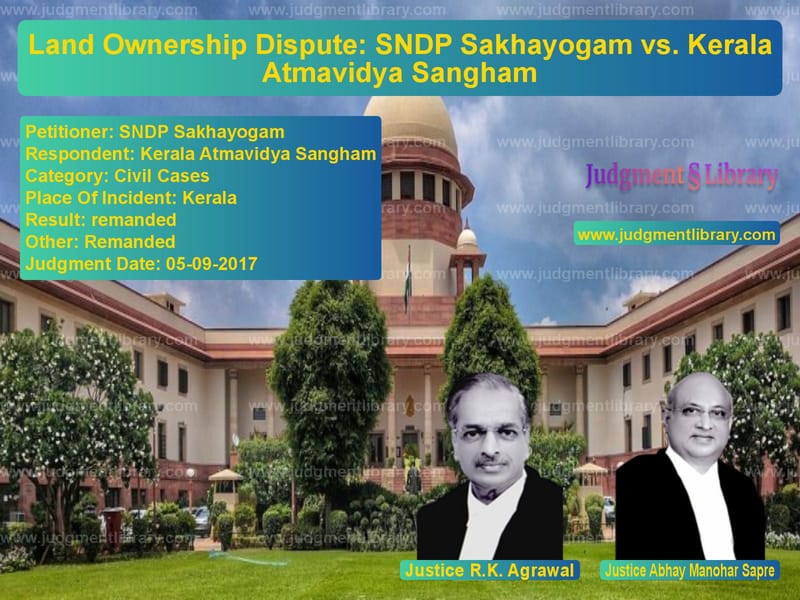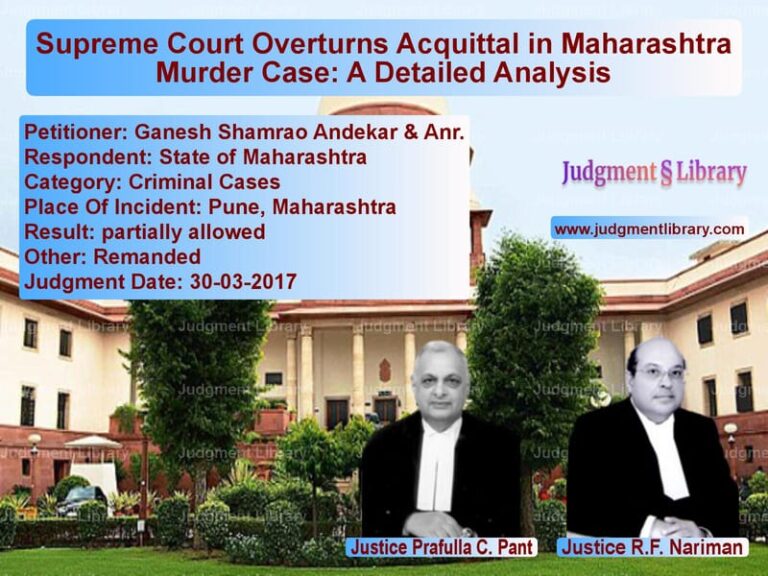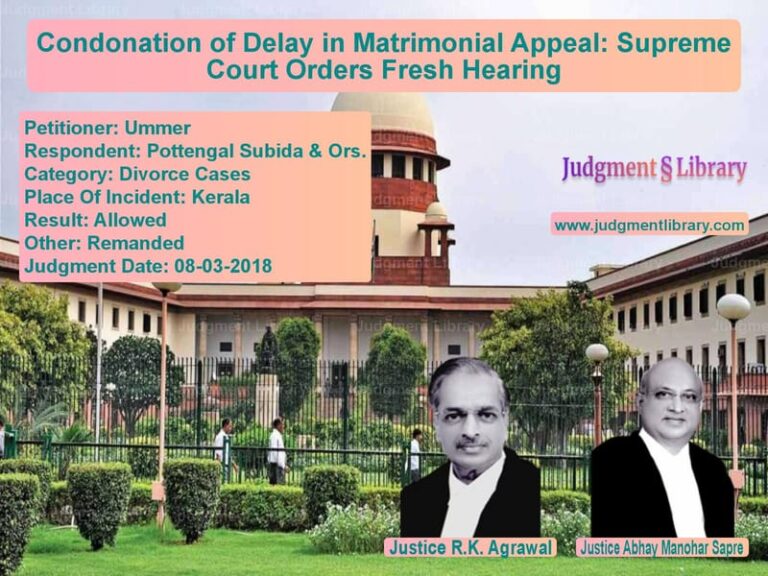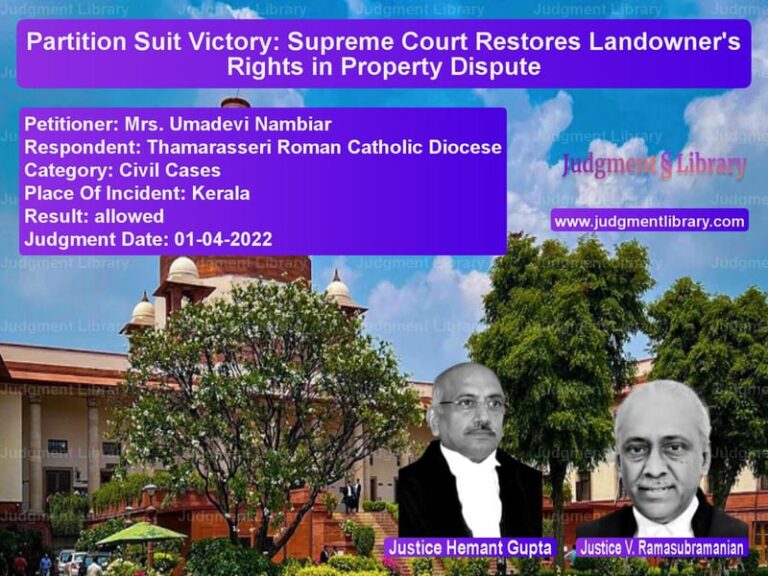Land Ownership Dispute: SNDP Sakhayogam vs. Kerala Atmavidya Sangham
The case of SNDP Sakhayogam vs. Kerala Atmavidya Sangham revolves around a dispute over land ownership and the procedural aspects of representative suits under Order 1 Rule 8 of the Code of Civil Procedure (CPC). The Supreme Court was required to determine whether a juristic person, such as a registered society, could invoke the provisions of Order 1 Rule 8 and whether the case was correctly adjudicated by the lower courts.
The dispute involved a piece of land located in Kerala, which was claimed by both parties. The plaintiff, Kerala Atmavidya Sangham, argued that the land was acquired for charitable purposes and that the defendant, SNDP Sakhayogam, had no authority to transfer it. The trial court and appellate courts dismissed the suit, but the Kerala High Court reversed the decision. The matter was then brought before the Supreme Court.
Background of the Case
The timeline of events provides insight into the legal complexities involved:
- The plaintiff (Kerala Atmavidya Sangham) filed a suit in 1978 for the cancellation of a sale deed executed in favor of the defendant (SNDP Sakhayogam).
- The plaintiff claimed that the land was acquired for charitable purposes and that the sale was unauthorized.
- The trial court dismissed the suit in 1980, and the appellate court upheld this decision in 1986.
- The High Court reversed the lower court rulings in 1995 and decreed in favor of the plaintiff.
- The Supreme Court, in 2003, remanded the case to the High Court for reconsideration.
- On remand, the High Court again ruled in favor of the plaintiff in 2005, prompting the present appeal before the Supreme Court.
Legal Issues
The Supreme Court identified the following key legal questions:
- Can a juristic person, such as a registered society, file a representative suit under Order 1 Rule 8 CPC?
- Did the plaintiff establish a valid claim to the land?
- Was the trial court correct in dismissing the suit, or did the High Court err in reversing its decision?
- What is the effect of procedural lapses in a suit concerning property ownership?
Arguments by the Appellant (SNDP Sakhayogam)
The appellant, SNDP Sakhayogam, made the following arguments:
- The plaintiff society had no legal standing to file a representative suit under Order 1 Rule 8 CPC.
- The sale deed executed in their favor was legally valid and did not require the plaintiff’s consent.
- The lower courts had correctly dismissed the suit, and the High Court had erred in reversing their decision.
- The case involved a property dispute, which should have been adjudicated based on ownership documents rather than procedural technicalities.
Arguments by the Respondent (Kerala Atmavidya Sangham)
The respondent, Kerala Atmavidya Sangham, countered with the following arguments:
- The land was acquired for charitable purposes, and its sale was unauthorized.
- The suit was rightly filed in a representative capacity, as the organization had a legitimate interest in protecting the property.
- The High Court had correctly applied the law in recognizing the plaintiff’s claim.
Observations of the Supreme Court
The Supreme Court carefully examined the procedural aspects of the case and the substantive issues concerning land ownership. It noted:
‘One question, which goes to the root of the case affecting the very jurisdiction of the Court to try the suit, was not taken note of and if taken note of, it was not decided in its proper perspective by any of the Courts below.’
The Court further held:
‘In our considered view, the issue of jurisdiction which goes to the root of the case, if found involved, has to be tried at any stage of the proceedings once brought to the notice of the Court.’
The Supreme Court found that the trial court had failed to properly consider whether the plaintiff, a juristic person, could invoke Order 1 Rule 8 CPC. It also noted that the procedural errors in the lower courts warranted a fresh examination of the case.
Final Judgment
The Supreme Court set aside the High Court’s ruling and remanded the case back to the trial court, stating:
- The trial court must reexamine the case, specifically addressing the issue of whether the plaintiff could file a representative suit.
- The procedural lapses in the lower courts necessitated a fresh trial.
- The trial court should determine the ownership of the property based on the available evidence and not merely procedural technicalities.
The Court emphasized that it had not made any findings on the merits of the case and left all issues open for reconsideration.
Impact of the Judgment
This ruling has significant implications for property disputes and procedural law in India:
- It clarifies the scope of Order 1 Rule 8 CPC and whether a juristic person can file a representative suit.
- It highlights the importance of properly adjudicating jurisdictional issues before proceeding with a case.
- It underscores the necessity of thorough judicial scrutiny in property disputes to ensure that decisions are made based on substantive rights rather than procedural lapses.
Conclusion
The Supreme Court’s judgment in SNDP Sakhayogam vs. Kerala Atmavidya Sangham reinforces the principle that procedural and jurisdictional issues must be carefully examined in property disputes. By remanding the case back to the trial court, the Court ensured that all legal questions, including the plaintiff’s eligibility to file a representative suit, are properly addressed. This ruling serves as a critical precedent for future cases involving similar legal and procedural issues.
Don’t miss out on the full details! Download the complete judgment in PDF format below and gain valuable insights instantly!
Download Judgment: SNDP Sakhayogam vs Kerala Atmavidya San Supreme Court of India Judgment Dated 05-09-2017.pdf
Direct Downlaod Judgment: Direct downlaod this Judgment
See all petitions in Property Disputes
See all petitions in Contract Disputes
See all petitions in Specific Performance
See all petitions in Judgment by R K Agrawal
See all petitions in Judgment by Abhay Manohar Sapre
See all petitions in Remanded
See all petitions in Remanded
See all petitions in supreme court of India judgments September 2017
See all petitions in 2017 judgments
See all posts in Civil Cases Category
See all allowed petitions in Civil Cases Category
See all Dismissed petitions in Civil Cases Category
See all partially allowed petitions in Civil Cases Category







